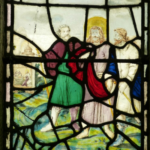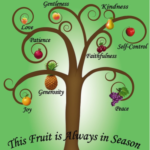Finding Destiny In Disappointment

“The LORD is close to those who have suffered disappointment. He saves those who are discouraged” (Psalm 34:18-19 ERV).
You might have seen the above Scripture before worded slightly different with the words “broken-hearted” in place of “those who have suffered disappointment.” I like the ERV translation because it uses a word that resonates with me, and perhaps you, “disappointment.”
I fear that some of us have been so familiar with disappointment, that it no longer manifests as “broken heartedness.” Instead, we lower our expectations of ourselves and others to avoid disappointment. I recall as a child overhearing an adult say, “If you expect little of yourself and others, you will never be disappointed.” This is true, but this is not the life I want.
This life comes with few certainties besides death and taxes. One of them is we will face disappointment. The Rev. Dr. Martin Luther King, Jr. once said, “We must accept finite disappointment, but never lose infinite hope.” Hope in the face of disappointment is sometimes all we have but it is all we need to walk by faith. Amen!
Disappointment is the proverbial fork in the road of life. It is at this fork that we must choose to either remain bitter or not. The road absent of disappointment is indeed the road less traveled. This road is one that not only eventually leads the traveler to a deeper understanding of Romans 8:28, “God causes all things to work together for good to those who love God, to those who are called according to His purpose” (Rom. 8: 28). This road can also allow sojourners to discover their destiny, perhaps not as noteworthy as Saul discovering his destiny on the road to Damascus. However, each destiny in the Body of Christ is important.
All of us will cause disappointment in others, and this seems to be one of the rare talents that I have. The story of Joseph being sold into slavery by his jealous brothers is a great example of destiny coming from disappointment. Years later, he told them, “You meant evil against me, but God meant it for good” (Genesis 50:20). The brothers’ wickedness was the tool to get Joseph to Egypt! Surely, Joseph was disappointed, and angry, at the jealous action of his brothers. However, he became the second-in-command in Egypt and saved his entire family from a seven-year famine. His destiny came out of disappointment.
Disappointment allows the Refiner of silver to burn away the dross as described in Malachi 3:3, “He will sit as a refiner and purifier of silver…” The refinement is not an end to itself. The last sentence in Malachi 3:3 reads, “Then the LORD will have men who will bring offerings in righteousness.”
Disappointment is the proverbial fork in the road of life. It is at this fork that we must choose to either remain bitter or not. The road absent of disappointment is indeed the road less traveled. This road is one that not only eventually leads the traveler to a deeper understanding of Romans 8:28, “God causes all things to work together for good to those who love God, to those who are called according to His purpose” (Rom. 8: 28). This road can also allow sojourners to discover their destiny, perhaps not as noteworthy as Saul discovering his destiny on the road to Damascus. However, each destiny in the Body of Christ is important.
All of us will cause disappointment in others, and this seems to be one of the rare talents that I have. The story of Joseph being sold into slavery by his jealous brothers is a great example of destiny coming from disappointment. Years later, he told them, “You meant evil against me, but God meant it for good” (Genesis 50:20). The brothers’ wickedness was the tool to get Joseph to Egypt! Surely, Joseph was disappointed, and angry, at the jealous action of his brothers. However, he became the second-in-command in Egypt and saved his entire family from a seven-year famine. His destiny came out of disappointment.
Disappointment allows the Refiner of silver to burn away the dross as described in Malachi 3:3, “He will sit as a refiner and purifier of silver…” The refinement is not an end to itself. The last sentence in Malachi 3:3 reads, “Then the LORD will have men who will bring offerings in righteousness.”
These periods of disappointment produce the good fruit of endurance and character. Romans 5:3-4, teaches, “We rejoice in our sufferings, knowing that suffering produces endurance, and endurance produces character, and character produces hope…” Hope is an infinitely precious commodity during periods of disappointment.
Moses circled the Sinai desert as he followed Jethro’s sheep for 40 years. He surely must have remembered his place at Pharaoh’s palace. Now, he is freezing at night and living in misery.
Suddenly, “destiny.” God speaks to him from a burning bush. God’s is molding a plan to return Moses to Egypt. Neither the disappointment of Joshua or Moses could stop their destiny.
Jesus certainly felt disappointment when He was denied three times by Peter. Also, He must have felt disappointed when He said on His cross, “My God, my God, why have You forsaken Me?”
As for me, I have had a good friend ask me after a bad experience, “Aren’t you angry at that person?” My answer is always “No, I am disappointed.” I am intentional, but not always successful, in not allowing others to stir up anger in me. I try my best to follow the wisdom of James 1:19-20, which instructs, “Everyone should be quick to listen, slow to speak and slow to become angry” (emphasis added). The next verse provides the reason for the instruction – “Because human anger does not produce the righteousness that God desires.” Anger provides the enemy a “foothold” and opens the doors to sin, wrath, and poor choices. Good fruit will never be found behind any of these doors.
I have frequently been disappointed in outcomes, other people, and especially myself. I also know that I have disappointed others, and as the president of the people pleaser club, I deeply regret each occurrence.
During the periods in which we are disappointed in others, God, or outcomes, this is when we must yoke up with God and trust that our destiny lies beyond the disappointment. I have found that the sooner I am able to focus on my future destiny rather than my current disappointment, then the faster I can overcome my disappointment. In the past, I have spent years waiting on God to reveal my destiny, and I eventually realized that He was waiting on me to resolve my disappointment.
Just as Scripture warns us against storing up our treasure up on earth (Matthew 6:19-21), putting our trust in men (Psalm 146:3) will also end poorly. The former leads to destrution and the later will not lead to salvation. Both are on ramps to disappointment.
I mentioned above that God was waiting on me to resolve my disappointment. I resolved, and continue to resolve, my disappointment by standing steadfast on Psalm 37:4: “Take delight in the ways of the LORD, and He will give you the desires of your heart” and Romans 8:28. Destiny defeats disappointment, believe me. Be blessed as you are a blessing to others.
Prayer: Dead God, Thank you for providing us with a pathway out of the valley of disappointment. Send your Holy Spirit to comfort us when we are disappointed and send Your Spirit to comfort those that we disappointed. Help us, dear God, to pray for those that have disappointed us and for those that we have disappointed. In all circumstances, may Your name be glorified and may we be so blessed as to have our disappointment lead to our destiny. Amen.
Meet the Author
Todd Shupe is a Certified Lay Minister and Men’s Ministry Specialist through Francis Asbury Methodist Church in Baton Rouge, LA. He is a Board Member for Gulf South Men, an Action Team member for The Kingdom Group, and a Board Member for the Lagniappe Country Walk to Emmaus. Todd is a contributor to Project XII and Baton Rouge Parents Magazine. He is a Past President of the Baton Rouge District of United Methodist Men and remains active in this and many other local, regional, and international ministries. Additionally, he’s the author of the inspiring book “Fathering A Special Needs Child.” Todd also enjoys filling the pulpit to share the Good News of our Lord and Savior. Todd is the proud father of Emma and Kyle and resides in Baton Rouge, Louisiana.
We welcome your comments below.
Thank you for visiting. We trust that you have enjoyed reading our articles.
Liked this post?
Read more below or search for more topics...
-
Book Review: God Knows Your Story (and He’s Not Mad!)
Book Review: God Knows Your Story (And He’s Not Mad!) by Carter Featherston “For your goodness and love pursue me all the days of my life” (Psalm 23:6 TPT).If you have never done anything wrong and do not have any regrets or shame, then this book is not for you. However, I strongly suspect that all of us have regrets and feel some sense of shame for poor choices. This is a Biblically based book that points the reader to the only true source of victory of sin and shame, Jesus. This book is valuable because it addresses a topic that all... -
What Does God Want From You?
What Does God Want From You? “For I desire mercy, not sacrifice, and acknowledgment of God rather than burnt offerings” (Hosea 6:6 NIV).Through our prayers and petitions we make it very clear what we want from God, but have you ever stopped to think what does God want from me? I had a friend once tell me that for years he viewed God as a “mystical vending machine.” Many Christians believe that if we give our tithes and offerings to our local church, then we have “done our part.” Moreover, we sometimes confuse God with Santa Claus and think that if we... -
A Prayerful Life
A Prayerful Life 16“Rejoice always, 17 pray continually, 18 give thanks in all circumstances; for this is God’s will for you in Christ Jesus.” 1 Thessalonians 5:16-18 (NIV) The Bible has much Scripture that encourages us to seek God through prayer. The Gospels and the Epistles are particularly filled with Holy Scripture that encourages us to seek God’s face through prayer. Our direct line of communication to God is prayer. It is a deeply personal process by which we bring Him our prayers of thanksgiving and supplication. We go into our inner room and pray to our loving Father with full confidence that He hears us and...












































